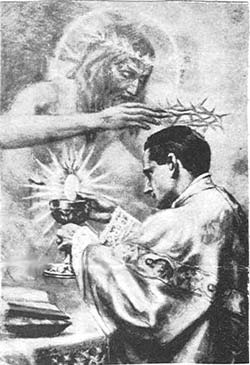The Apostolicity of the Eucharist and of the Church
Ecclesia de Eucharistia - Chapter III
Only a priest can consecrate
...It is the ordained priest who, “acting in the person of Christ, brings about the Eucharistic Sacrifice and offers it to God in the name of all the people.” For this reason, the Roman Missal prescribes that only the priest should recite the Eucharistic Prayer, while the people participate in faith and in silence.
 The expression repeatedly employed by the Second Vatican Council, according to which “the ministerial priest, acting in the person of Christ, brings about the Eucharistic Sacrifice”, was already firmly rooted in papal teaching. As I have pointed out on other occasions, the phrase in persona Christi “means more than offering 'in the name of' or 'in the place of' Christ. In persona means in specific sacramental identification with the eternal High Priest who is the author and principal subject of this sacrifice of His, a sacrifice in which, in truth, nobody can take His place”.
The expression repeatedly employed by the Second Vatican Council, according to which “the ministerial priest, acting in the person of Christ, brings about the Eucharistic Sacrifice”, was already firmly rooted in papal teaching. As I have pointed out on other occasions, the phrase in persona Christi “means more than offering 'in the name of' or 'in the place of' Christ. In persona means in specific sacramental identification with the eternal High Priest who is the author and principal subject of this sacrifice of His, a sacrifice in which, in truth, nobody can take His place”.
The ministry of priests who have received the sacrament of Holy Orders, in the economy of salvation chosen by Christ, makes clear that the Eucharist which they celebrate is a gift which radically transcends the power of the assembly, and is in any event essential for validly linking the Eucharistic consecration to the sacrifice of the Cross and to the Last Supper. The assembly gathered together for the celebration of the Eucharist, if it is to be a truly Eucharistic assembly, absolutely requires the presence of an ordained priest as its president. On the other hand, the community is by itself incapable of providing an ordained minister. This minister is a gift which the assembly receives through episcopal succession going back to the Apostles. It is the Bishop who, through the Sacrament of Holy Orders, makes a new presbyter by conferring upon him the power to consecrate the Eucharist. Consequently, “the Eucharistic mystery cannot be celebrated in any community except by an ordained priest, as the Fourth Lateran Council expressly taught.” (...)
The Catholic faithful, therefore, while respecting the religious convictions of our separated brethren, must refrain from receiving the communion distributed in their celebrations, so as not to condone an ambiguity about the nature of the Eucharist and, consequently, to fail in their duty to bear clear witness to the truth. This would result in slowing the progress being made towards full visible unity. (...)
When a community lacks a priest, attempts are rightly made somehow to remedy the situation so that it can continue its Sunday celebrations, and those religious and laity who lead their brothers and sisters in prayer exercise in a praiseworthy way the common priesthood of all the faithful based on the grace of Baptism. But such solutions must be considered merely temporary, while the community awaits a priest.
The sacramental incompleteness of these celebrations should above all inspire the whole community to pray with greater fervour that the Lord will send labourers into His harvest (cf. Mt 9:38). It should also be an incentive to mobilize all the resources needed for an adequate pastoral promotion of vocations, without yielding to the temptation to seek solutions which lower the moral and formative standards demanded of candidates for the priesthood. (...)
The Eucharist builds the Church |
The Eucharist and Ecclesial Communion |